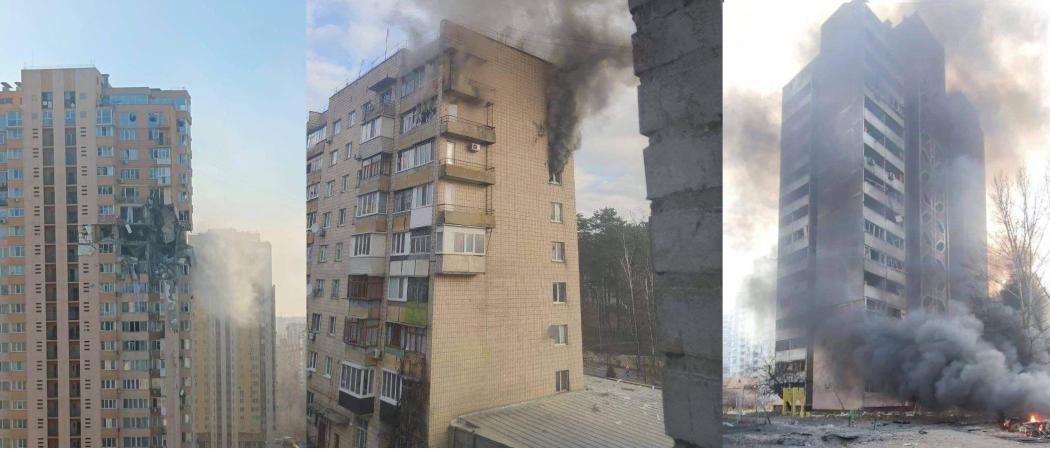Few researchers in Ukraine are able to continue work, and most have left their posts to join the army, hide in bomb shelters or flee the country

Pictures sent to us by Olga Polotska show the destruction of residential buildings in Ukraine.
Science in Ukraine has come to a halt. Russia’s invasion has crippled the country’s newly established research agency and forced its leader to a bomb shelter in Kyiv.
During the day, Olga Polotska, the executive director of the National Research Foundation of Ukraine (NRFU), is helping deliver food and supplies across Kyiv. At night she has to go back to an underground shelter from where she is trying to keep herself and her agency alive, checking updates on social media from researchers scattered across the country.
In a phone interview with SciencełBusiness from Kyiv 28 February, she appeals for assistance to Ukrainian scientists. Any kind of international joint programmes involving Ukrainian researchers would help keep the country’s science base alive. “Ukrainian scientists will need a lot of support,” Polotska said.
The agency was founded in 2018 and became fully operational only two years later. It was part of a push by the Ukrainian government to establish a research institution that can organise transparent and excellence-based funding competitions for Ukrainian researchers. The new institution was expected to help improve an underfunded research system and to halt the exodus of academics and scientists to the west.
The new agency was meant to give Ukraine’s top scientists the opportunity to compete for money outside the regular funding that usually covers the basics: salaries and the utility bills. “Ukrainian science has been underfinanced for many years,” Polotska said.
But in the chaos triggered by the Russian invasion the agency had to stop the rollout of funds to 269 projects which were meant to start on March 1st. Science in Ukraine has come to a halt. “Everything has stopped,” Polotska said.
Only a few researchers are still able to continue their work, while most have left their posts to join the army, hide in bomb shelters, or have simply fled their homes and become refugees in neighbouring countries. Some have found themselves stuck in territories occupied by the Russian army.
Polotska said her colleagues in Kharkiv, a city of 1.4 million in the north-east of the country, have informed her that the buildings of the research institute of physics and technology, and the educational research institute in the city, have been destroyed by bombings. “I suspect other [research buildings] are heavily damaged,” she said.
Polotska has also received reports from colleagues who have joined various paramilitary groups organised under the so-called Territorial Defense Forces, which are arming civilians who want to fight. “Some scientists took weapons and went to defend Ukraine,” she said.
According to reports from Kyiv, Kharkiv and other cities, Russian forces are bombing residential areas without any regard to civilian lives. In the fog of war, “there is a very high chance of researchers being wounded or killed,” said Polotska.
The loss of academics and scientists – either in combat or in forced displacement – would be “tragical”, said Polotska, and goes against the agency’s plan to halt brain drain and come up with funding schemes that offer decent salaries and equipment.
Call for international help
Researchers in some areas of Ukraine are still able to work but eventually may want to move their projects temporarily to another country. But not all teams would choose that path. “Some of them will be able to continue research here, some will need [foreign] support,” she said.
The agency she runs could also use some international help finding foreign evaluators to review Ukrainian proposals, Polotska added. Until a ceasefire is reached and the agency can go back to work, Ukraine needs further military and humanitarian help, along with stricter sanctions on the Russian economy.
In a statement published on the agency’ website shortly after the war started, Polotska urged researchers in western Europe to cut ties with Russian counterparts. “We are also convinced that immediate severance of all your ties with Russian scientific structures, which are in the service of the totalitarian fascist regime, is urgently needed,” the statement said.
On Friday, Germany was the first EU country to announce a full stop to its long-standing cooperation with Russia in science, research, and vocational education and training, but other countries are still debating whether to take similar decisions.
“Some people in the western world might have heard very little about Ukraine. I want to tell Europe that we are part of the civilised world and we have felt free to make our own decisions, politically and strategically. Now everything is danger,” said Polotska.
Shortly after our phone call ended, Ukrainian news media reported sirens began to wail in Kyiv, warning residents to head back to the nearest bomb shelter. A new curfew has started at 8pm local time.





 A unique international forum for public research organisations and companies to connect their external engagement with strategic interests around their R&D system.
A unique international forum for public research organisations and companies to connect their external engagement with strategic interests around their R&D system.